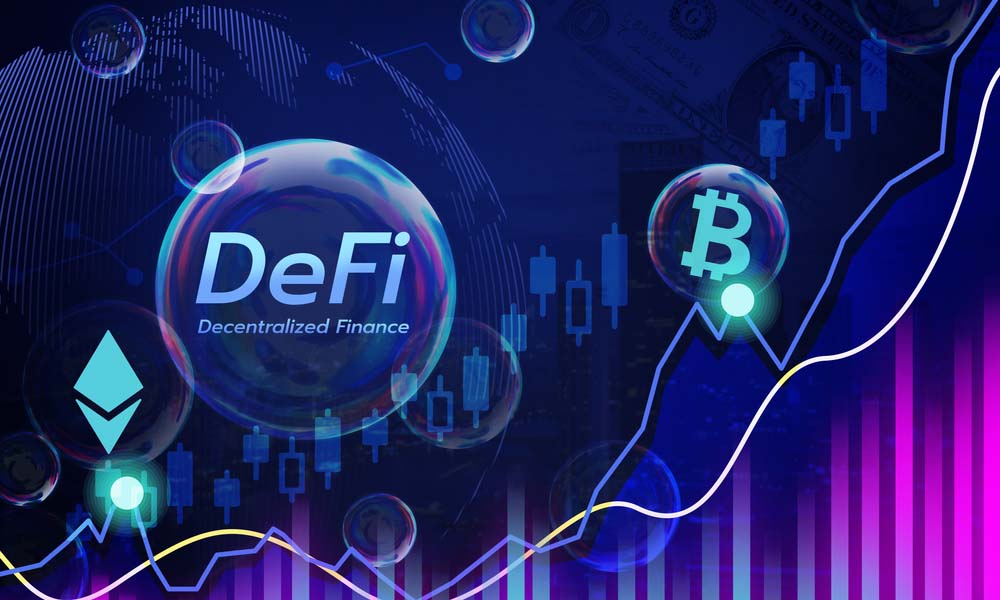
The world has been rocked by the abrupt rise in the cryptocurrency industry. Whether you’re completely new to the world of cryptocurrency or you have some investing expertise, there is a lot to learn about DeFi tokens; the hottest new digital asset everyone is talking about.
Decentralized finance, or DeFi, is one area of cryptocurrencies that is receiving much attention. This refers to financial services that use the best smart contracts. These automated enforceable contracts use internet blockchain technology in place of intermediaries like banks or lawyers and may be enforced immediately.
Decentralized finance (DeFi) bridges the gap between the novelty of cryptocurrencies and the well-known conventional financial system. The DeFi initiative offers consumers several financial services that are typical of conventional financial institutions, such as loans, lending, and insurance.
Due to the fact that not all cryptocurrency projects in the market have these financial services in their portfolio, DeFi projects are regarded as a crucial component of every diversified investment plan.
Similar to bitcoins, DeFi eliminates the requirement for a centralized body. But even for experienced traders, the way it functions still needs to be discovered. So continue reading to learn how DeFi functions, and let’s uncover the truth about DeFi and related information about it.
What is DeFi? Explained In Detail
DeFi, short for “decentralized finance,” seeks to duplicate current financial goods and services on a blockchain by utilizing smart contracts and decentralized protocols.
DeFi is an acronym for decentralized financial infrastructure, which refers to open-source financial software that runs independently on a blockchain network and allows anyone with an internet connection to access fundamental financial services like borrowing, lending, and investing without the need for a middleman.
For instance, a cryptocurrency owner may deposit money into a decentralized lending protocol to earn interest instead of putting it in a savings account at a bank, and the interest rate would normally be much higher than it would be in a standard savings account.

Source: Markets Media
Interest rates are often more appealing than those offered by traditional banks, and borrowing is easier than it would be under a conventional system. Therefore, the primary prerequisite for obtaining a DeFi loan is typically the capacity to offer collateral in the form of other crypto assets. Depending on the DeFi protocol being utilized, users may occasionally offer their NFTs, or non-fungible tokens, as collateral.
How Does DeFi Work?
Most DeFi protocols and applications at the moment are created on Ethereum.
Ethereum has expanded the technology and ideas that underlie Bitcoin. Ethereum is a global, decentralized technological network that supports protocols and apps that use smart contracts, not merely money.
As such, it is neither owned nor managed by a single company. Like Bitcoin, Ether is the native cryptocurrency of Ethereum and can be bought on cryptocurrency exchanges or created through mining (for now).
Investors are encouraged to conduct due diligence and may only wish to contribute funds they can afford to lose to DeFi because it is currently mostly unregulated and not covered by the FDIC like regular banks are.
What Makes DeFi Unique from Traditional Finance?
Traditional finance is very tightly regulated and frequently involves a lot of costs. Although we are more accustomed to conventional finance, DeFi offers:
- Much greater levels of transaction autonomy are required; deals can be structured without waiting periods, and no permissions are required to perform transactions.
- Improved disclosure of transactions and fees
- A higher level of faith in the technology itself as opposed to middlemen like banks
These benefits are not without possible risks, though. DeFi is still uncharted territory, and because transactions are visible on the public decentralized blockchain, it is also less private.
How to Connect with Defi Tokens?
The main way to use DeFi is through dApps, or software programs operating on the Ethereum blockchain. Unlike a regular bank, there is no requirement to complete an application or open an account.
Here are a few of the ways people are currently connecting with DeFi:
- Lending: Instead of just once a month, earn money and gain benefits by lending out your cryptocurrency.
- Obtaining a Loan: You can obtain a loan without waiting for the documentation to be completed, even for brief “flash loans” that conventional banking institutions won’t provide.
- Trading: Trade crypto assets peer-to-peer, just like you would if you were buying and selling stocks directly from the market without using a broker.
- Future planning: Invest a portion of your cryptocurrency holdings in non-traditional savings accounts to earn higher interest rates than a bank would.
- Purchase derivatives and make long- or short-term bets on various assets. Think of them as the futures contracts or stock option equivalents of the crypto world.
Is Investing in DeFi Safe?
Because DeFi technology is so young, unpleasant effects occasionally happen. DeFi technology-based startups may fail (startup failure is extremely prevalent), and programming mistakes can lead to lucrative possibilities for hackers. If a DeFi project you invested in or stored money with fails, you could lose all of your money.
The Federal Deposit Insurance Corporation (FDIC) insures deposits with traditional centralized financial institutions, but DeFi platforms typically don’t offer any way of money recovery.
Consumers can report to the Consumer Financial Protection Bureau (CFPB) if a typical financial transaction goes wrong, but if they fall victim to a fraudulent DeFi transaction, they have no such remedy.
- It’s interesting to note that a different kind of DeFi program is becoming accessible to overcome these shortcomings.
- Those looking for a way to safeguard themselves against losses from other smart contracts are offered decentralized insurance produced by individuals pooling their money as collateral.
- The premiums paid by those who are insured are collected by the individuals who contribute to the bitcoin pools.
DeFi’s Future: Is It Bright or Just a Fad?
The DeFi boom is already beginning to show symptoms of slowing down, but this was inevitable. So the actual query is: will it stabilize and eventually reach a level of sustainability, or will it crash?
DeFi will need to solve several fundamental problems before it can progress to this point. For example, smart contract bugs are one issue that users and investors are still very concerned about regarding security.
Regulatory worries persist, just like they do with cryptocurrencies in general. Due to the lack of restrictions in the industry at the moment, it is possible for DeFi projects to become illegal at any time. However, long-term confidence would increase with some industry-wide restrictions.
Stablecoins have a huge potential to grow in use in the upcoming years because global economic issues are not going to go away anytime soon. Early adopters include countries with hyperinflation, like Venezuela, and this pattern is likely to continue.
Summary
Even if new DeFi coins are constantly being released, DeFi Coin is the most worthwhile investment in 2025.
DeFi applications will likely continue to imitate financial institutions that “we already know and enjoy in the traditional banking industry,” such as high-yield savings accounts, in the future, according to analysts.
Numerous new developments are in store for us as a result of the revolutionizing of the gaming sector, the emergence of decentralized financial assets, and the integration of conventional assets into the crypto sphere. As a result, the DeFi-related use cases are growing. In addition to lending, borrowing, and purchasing DeFi tokens, cryptocurrency aficionados have begun to develop their own digital currencies.
If you are looking to build your own DeFi project, Elluminati is the blockchain development company that offers a set of services related to decentralized solutions, including blockchain technology for development.












